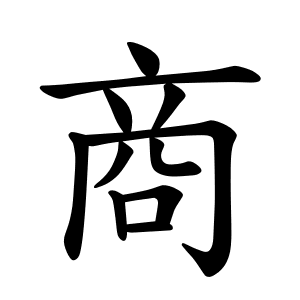商
- merchant, commerce, trade;
- to calculate, to assess;
- the Shang dynasty;
Etymology
Oracle bone script: originally depicted 丙 (bing, “south”) with 辛 (xin, “bitter”) inserted, but the exact origin is uncertain.
In bronze inscriptions, the component 口 (mouth) was added at the bottom, leading toward the modern form.
Originally referred specifically to the Shang dynasty (商朝); later extended to mean “to trade”, because many displaced Shang people became merchants.
Usage in Korean
商人 (상인) — merchant, trader
商業 (상업) — commerce, business
商量 (상량) — to discuss, consult
商店 (상점) — shop, store
商務 (상무) — business affairs
Additional notes
In mathematics, 商 also means quotient, i.e., the result of division.
In Japanese, 商 is used in the set 和差積商 (“sum, difference, product, quotient”).
In classical contexts, it still refers to the Shang dynasty.
Words that derived from 商
- 대상(大商)–wealthy merchant; influential merchant
- 상고(商高)–commercial high school
- 상술(商術)–business skill; marketing strategy; sales gimmick
- 상업(商業)–commerce; trade
- 상의(相議/商議)–discussion
- 상인(商人)–merchant; dealer
- 상품(商品)–product; goods
- 상호(商號)–company name; firm name
- 지하상가(地下商街)–underground shopping center
- 통상(通商)–commerce; trade; commercial relations
商
장사
상
jangsa
sang
Kangxi radical:30, 口 + 8
Strokes:11
Unicode:U+5546
Cangjie input:
- 卜金月口 (YCBR)
Composition:
- ⿳ 亠 丷 冏
